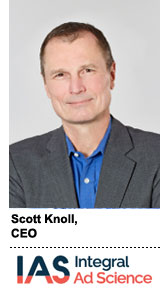
The odds are stacked against ad tech companies that go public. But Integral Ad Science CEO Scott Knoll wants to buck that trend.
Among a trio of leading verification companies, it’s the only one left that hasn’t taken an exit. Oracle bought Moat in April 2017 and bolted on brand-safety tool Grapeshot a year later with a second acquisition. Private equity firm Providence Equity Partners snapped up a majority stake in DoubleVerify four months later.
As it approaches its 10-year anniversary next year, Integral Ad Science stands alone.
“If we were swallowed up by another company, it’s harder to execute,” Knoll said. “You don’t own your own road map. It would be a shame for us to do that.”
To differentiate on the product side, Integral Ad Science wants to become more than just a verification company. Eliminating fraud and ensuring an ad has been seen and doesn’t appear next to objectionable content simply brings a brand “back to zero,” Knoll said. Integral Ad Science (IAS) wants to help brands move beyond zero.
He’s allocating engineering resources to help brands determine the optimal amount of time consumers should see their ads.
“We trend to treat viewability as a binary metric,” Knoll said. “In reality, length of time is a critical component of effectiveness.”
A brand might discover it needs five seconds of view time to get through to consumers and it can then shift media spend to places where it can reach that ideal view-time threshold.
Knoll talked to AdExchanger about how he’s prepping the company for its next chapter.
AdExchanger: Is it part of your job right now to find an exit for the company?
SCOTT KNOLL: My job is to create as valuable of a company as possible. At the same time, if there is an opportunity to do that in an even better way, then that makes sense.
But right now, we feel there is a lot of runway in terms of what we are doing and a big opportunity in front of us, so we’re trying to do that as successfully as possible.
By runway, you mean what exactly?
We feel like we are barely scratching the surface in terms of what we will be able to do in the industry with verification and beyond it.
So, not runway in the sense of how much money IAS has left.
We are profitable and growing fast.
In ad tech, there can be a situation of the last person at the dance without a partner…
Which can be a good thing or a bad thing.
And what’s the case for IAS?
It can be a distraction. But we’ve done a good job of not making it a distraction. We’ve been stating for quite a while now that we think we would be a strong public company candidate and we’re focused on moving in that direction. The size, scale and story – we’re able to do that.
So, you’re getting your books in order?
There is a lot of work that goes into becoming a public company that we’ve started.
Going public is harder than being acquired, right?
If you are a good public company with a really good story – you have a strong business model, great clients, growth and an international presence – being a public company is the way to go. Most companies don’t have that. But take someone like The Trade Desk. They’re worth a lot of money right now and they’re doing a great job.
We feel like we’re one of the few in ad tech to have that opportunity. We don’t buy or sell media. We’re really a software-as-a-service business that happens to be in ad tech rather than an ad tech business. And we work with everyone in the market, both buyers and sellers, in some capacity. So as the market grows, we grow.
Are there cons to going public?
There’s a lot more rigor that goes into everything you do. You’re susceptible to macro changes in the market you have no control over. But the pros are you have access to capital, you can grow faster because you have a greater ability to acquire other companies. Ultimately, you can remain independent and grow into the opportunity that exists for us.
But if you’re part of a huge company – like Oracle – that’s a built-in brand name that CTOs know.
We have not seen that as an issue. The trust we have built up in the industry has taken a long time, and it’s one of the assets the company has.
What does the acquisition of Grapeshot by Oracle, which is combining it with Moat, mean for your business?
It means they are trying to play catch-up. We do viewability, brand safety and fraud. Other companies are trying to cobble together the same capabilities. And now we are in new areas beyond verification, like optimizing toward outcomes. We call it “protect and grow.”
Some ad tech companies have made a lot of noise about going public, and then nothing happened. What’s the timeline for IAS?
You mean like AppNexus?
There’s a lot of work to be done. We are putting that in place today. We don’t have a public timeline that we’ve mentioned.
This interview has been condensed and edited.
This post was syndicated from Ad Exchanger.

More Stories
The Tuesday Club hosts Women’s Work’s In(visible) exhibition in Tāmaki Makaurau
Under Armour Taps Estée Lauder Exec to Lead AI and Analytics
Lani Jamieson joins D3 to shape the next chapter of its growth